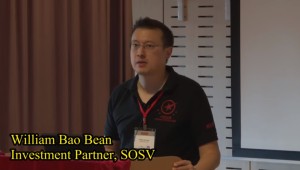
Startups should not expect to find the Promised Land in China, told VC-veteran William Bao Bean an investment conference on China in Tel Aviv last month. 95 percent of you should not be here, he told according to the Times of Israel. With one exception: Chinese internet companies cannot deal with algorithms. They urgently need mathematicians.
The Times of Israel:
So what chance does an Israeli entrepreneur have in China? The only way is with a sort of “spirit guide” who knows the playing field, and can find an opportunity – and Bean believes he has found it, in WeChat. “A couple of years ago Tencent decided that it would be better to partner with start-ups instead of destroy them. At Chinaccelerator we have developed several start-ups that allow us to use the WeChat platform to monetize social activity.” For example, one of the start-ups has developed an e-commerce platform for WeChat verticals, “so we have an e-commerce application for wine, luxury, travel,” and other verticals, said Bean.
But as Tencent and the other conglomerates try to compete in the more sophiscated areas of tech, like big data, they realize they need some outside help. “In China people do not value mathematicians, so it is very hard to find people who are good at algorithms,” said Bean. “It sounds ironic, but the Chinese in China are not very good in math. The good mathematicians in China fled to the West because they get paid a lot more over there.
“That’s where you guys come in,” said Bean. With all the mobile usage and data collection, companies like Tencent are awash in data, “but they have no idea what to do with it.” Israeli tech experts and big data start-ups have an opportunity to build applications and services for “the next billion,” the rising population of the Far East that is already dominating the international tech scene. With Israeli big data skills, Bean believes companies like Tencent – and the product groups within it – will see an advantage for themselves over their competition, internal and external.
The fact that Israeli entrepreneurs have skills that Chinese firms need will act as a brake on the average Chinese CEO’s competitive instincts, sparing locals from the ulcer-wrenching competition Chinese companies face. As someone who knows the playing field, Bean believes that the right companies can succeed – and those that do will be able to tap into a huge market opportunity.
But Israeli tech firms hoping to make it in China need to act fast.
“We’re actually making a bet here that Tencent won’t change its mind and go back to trying to destroy the start-ups we are bringing into the Chinese corporate sphere,” said Bean. But he believes that once the conglomerates – and their product groups – see what Israel has to offer, they will make an exception to their “crush, kill, destroy” rule.
“I’m all about unfair advantage, and bringing Israeli technical and programming skills will definitely give any company that works with start-ups based on Israeli tech an unfair advantage.” That, Bean said, might just be enough to enable an Israeli start-up to thrive in the toughest business environment they will ever face.
You can find his full speech here.
William Bao Bean is a speaker at the China Speakers Bureau. Do you need him at your meeting or conference? Do get in touch or fill in our speakers´ request form.
Are you looking for more experts on innovation at the China Speakers Bureau? Do check out this list.
